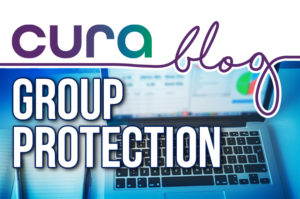Group protection insurance - our top 4 most commonly asked questions
Request a Callback
By clicking on submit I / We give consent for you to call me / us on the number provided to discuss my / our financial requirements.
Caring - Understanding - Reliable - Advice
Home » Guides & News » Group protection insurance – our top 4 most commonly asked questions
 Group protection insurance – our top 4 most commonly asked questions
Group protection insurance – our top 4 most commonly asked questions
Group protection insurance can seem quite complicated, which is exactly why we have decided to share some of the questions we get asked the most.
1. What is group protection insurance?
Group protection insurance is a policy that can be taken out by a limited company, to cover some or all of its employees. This can come in different forms, it could be group life insurance, group critical illness cover or group income protection. These policies can cover as little as 2 people (critical illness cover must be at least 3 people), or can cover hundreds of people.
Depending on the size of the company, there can be different categories which employees can be split into, meaning different employees could be covered for different amounts. For example:
Category 1 – directors,
Category 2 – managers and
Category 3 – all other employees.
Some companies choose to do these categories so that different levels of benefit can be arranged for different categories. As an example for life insurance:
Category 1 – directors – £600k life insurance to age 75,
Category 2 – managers – 5x salary to state pension age, available after 6 months service
Category 3 – all other employees – 3x salary to state pension age, available after 6 months service
It could also be that some companies decide to just give everyone access to the same level of cover. The beauty of group insurances is that you can tweak the way the policy is set up in many different ways, to suit a business’ needs.
For most group insurance policies, and certainly the ones that we advise on, the insurers require that we insure everyone of the same ‘level’ within a company. As an example let’s say that Group Life Ltd want to provide life insurance for their managers as a thank you for their hard work. There are 5 managers, but one of them isn’t pulling their weight, they are not a team player and the Directors are not particularly keen on them. The Directors don’t want to insure them. But, the rules of this insurance is that everyone that is in the same level within the organisation must be insured. We cannot pick and choose who is covered by the policy based upon personal feelings.
2. Does a group protection insurance policy cover existing medical conditions?
A free medical underwriting cap is normally in place when taking out a group life insurance or income protection policy. This simply represents the maximum amount of cover you are eligible for before your application must be reviewed by underwriters, who will then consider your personal health. This can mean that a person living with an existing medical condition can find that they can access insurance much more easily than if they tried to arrange cover personally.
It’s really important to know too that if the level of cover someone has puts them into an amount where an underwriter is going to assess their medical background, whatever the assessment is will not affect the insurance within the free cover level limit. This is again a lot of jargon and hopefully the below example will help:
- Suzanne is included in her group life insurance scheme with a benefit of 5x salary.
- This takes her above the free medical underwriting limit of £500k.
- Suzanne applies to get the full amount of £560k that matches her salary multiple.
- The insurer will assess the £60k above the free medical underwriting limit only.
- The insurer could increase the premiums or even decline the extra £60k depending upon Suzanne’s medical history, but, they cannot alter the £500k that she is entitled to within the free medical underwriting limit.
With group insurance, the insurers view every employee as part of the company’s “pooled risk.” This means that they establish a threshold, and below that amount they will cover anyone without requesting their medical history and without applying exclusions for life insurance and income protection. We tend to see that this amount may be up to £500,000 for group life insurance and £65,000 for income protection. These amounts could make a huge difference!
Group critical illness cover is a little bit different. Up until a certain point, having had a diagnosis in the past won’t impact the cost of the policy, but usually there will be an exclusion for pre-existing conditions. Meaning that if you had a medical condition before the policy started, you wouldn’t then be able to claim on the policy for that same condition, or a condition closely linked to the one that you had.
3. What are the benefits of group protection insurance?
There are so many benefits of having group protection insurance in place, and a lot of them go unnoticed. If you’re an employee with access to group protection insurance, it’s likely that this policy comes with value added benefits that you typically don’t need to pay extra for. Added benefits are just as they sound, they are extras that come with the policy, that anybody covered by the policy can access. Quite often, their immediate family can access these too.
These can be things such as:
- Mental health support
- Wellbeing services
- 24/7 online GP
- Rehabilitation services
- Second medical opinion
- Physiotherapy
These benefits are decided on after great amounts of research by insurers, into what is most needed by the people who will have access to them.
As well as the obvious, having group protection insurance can have a positive effect in other ways. We think that having one of these policies in place can have benefits to an employee’s commitment to their employer, as they will feel like their wellbeing really is being taken into account.
4. Are group insurance premiums tax deductible?
Group life insurance and income protection policies are paid for by the Company and the premiums can be offset against corporation tax.
Group critical illness cover works differently, in that the company pays for them, but they are classed as a P11D benefit for each employee. Some employers choose to absorb this cost and do some fanciness with their accountant, so that whilst it is an insurance that employees pay for, the employee doesn’t see the reduction to their take home earnings. Some employers will ask their employees to pay for their portion of the premium out of their personal earnings.
There are sometimes exceptions. Some firms, often quite large ones, offer group life insurance, critical illness cover and income protection as a voluntary scheme by employees. This means that employees can choose to pay to join the insurance or not. This can be a good way for people to get well priced access to these insurances, but these options sometimes don’t have the free medical underwriting limits that we discussed above, so please read the small print and make sure that you are eligible for the cover.
Things to watch out for
This is far too technical to cover here in detail, but with group life insurance there are two ways of setting it up: registered or excepted. If you have someone in the company that has any form of protected pension status you need to be very careful about which option that you choose, as there can be huge tax implications. It’s also really important to bear in mind that even if you don’t have someone in this position right now, you might employ someone in the future who does have such pension protections in place and this could lead to a costly mistake for all involved.
Group insurance policies can normally only be arranged by a protection insurance adviser, and that’s because of complexities like the one above. A protection insurance adviser can help you determine exactly what you are covered for and whether you are receiving all the cover that you need. If you are a business owner who is debating whether to take our group insurance for your employees or if you already have access to group insurance but are unsure of your position, please do get in touch with one of our advisers who would be more than happy to help or guide you in the right direction.
Related blogs
Group protection insurance, what is it and why should I have it?
Group Protection Insurance: An A-Z of key terms
Why your staff might like to be rewarded in other ways, other than just pay rises
Categories: Access to insurance
Client Reviews








Talk to a Friendly Adviser
Get a Quote
What We Offer?
- Experienced and knowledgeable advisers
- Specialist advice with no fees to pay
- Full assistance with all of your paperwork
- Put your policy into trust at no cost
- A dedicated insurance adviser for you
Our Recent Awards





































